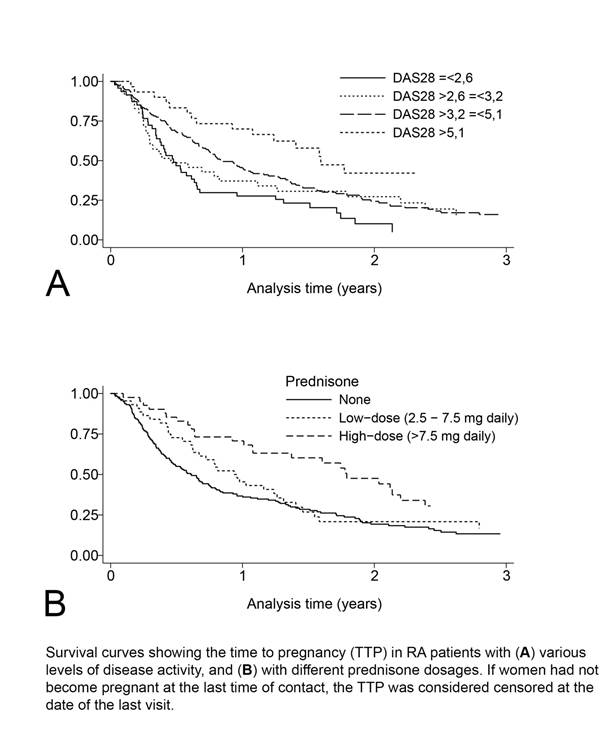Session Information
Session Type: Abstract Submissions (ACR)
Background/Purpose: Many female rheumatoid arthritis (RA) patients who try to conceive have a time to pregnancy (TTP) longer than 12 months. During this period RA often cannot be treated optimally. As a result, a longer TTP may result in higher chance of permanent joint damage, with a negative impact on social roles. Thus far, no studies on possible causes of the prolonged TTP in RA patients have been reported. In order to optimize care for these women, we aimed to identify clinical factors associated with a prolonged TTP in RA patients.
Methods: From 2002 until 2010, a nationwide prospective cohort study on pregnancy in RA patients (PARA study) was performed. Women with RA according to the 1987 American College of Rheumatology (ACR) criteria were included preconceptionally or during first trimester. All preconceptionally included women were actively trying to become pregnant. To study the effect of various disease characteristics and medications on the TTP, we performed a multivariable Cox regression analysis.
Results: Two-hundred-forty-five patients were included. The mean age was 31.3±3.9 years. The TTP was longer than 12 months in 42% of patients, of whom 40 women(16%) had not gotten pregnant during the follow up period. A longer TTP was related to various variables. Hazard ratios for occurrence of pregnancy were 0.96 (95%CI 0.92-1.00) per year increase in age; 0.52 (0.38-0.70) for nulliparity; 0.81 (0.71-0.93) per point increase in disease activity score (DAS28); 0.61 (0.45-0.83) for preconceptional prednisone use; and 0.66 (0.46-0.94) for non-steroidal anti-inflammatory drug (NSAID) use. Eighty-five patients used prednisone during the preconceptional period. The impact of prednisone use on TTP was dose-dependent, with a significant longer TTP when the daily dose was higher than 7.5 mg. TTP was not affected by smoking, disease duration, rheumatoid factor, anti-citrullinated protein antibodies, past methotrexate use, and preconceptional sulfasalazine use.
Conclusion: TTP in female RA patients is longer if patients are older or nulliparous, have higher disease activity scores, use NSAIDs or use prednisone in a daily dose higher than 7.5 mg daily. Treatment strategies during the preconceptional period should try to maximize suppression of disease activity, taking account of possible negative effects of NSAIDs use and use of higher doses of prednisone.
Disclosures: This study was funded by the Dutch Arthritis Foundation (Reumafonds).
Disclosure:
J. Brouwer,
None;
J. M. Hazes,
None;
J. S. Laven,
None;
R. J. Dolhain,
None.
« Back to 2013 ACR/ARHP Annual Meeting
ACR Meeting Abstracts - https://acrabstracts.org/abstract/reduced-fertility-in-women-with-rheumatoid-arthritis-influence-of-disease-activity-and-medication-use/

